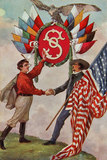Delenda Austria – Austria must be destroyed!
In view of the authoritarian measures that destroyed the political life and tender roots of democratisation during the First World War in Austria-Hungary, the political representatives of the Czech people remaining in the country had little scope for action. Politicians in exile took over the initiative and worked actively for the creation of an independent Czech state.
An outstanding role was played here by the professor of philosophy at Prague University and member of the Austrian Imperial Council Tomáš Garrigue Masaryk (1850–1937). Masaryk established himself as early as 1900 as an influential voice and moral authority on the Czech political scene. Orienting himself on West European models, he resolutely opposed nationalist Utopias. As representative of “Czechoslovakism”, he was committed to a unification of the Czechs and Slovaks. He fought for federalisation and democratisation of Austria-Hungary and in his essay Česká otázka (The Czech Question) published in 1895 he set out his programme for the future of the Czechs within the context of a reformed Habsburg Monarchy.
In view of the increasingly authoritarian proceedings of the Viennese Government since 1914 (closing of the Imperial Council, exacerbated censorship, placement of the civilian administration under Army Command), Masaryk came to see that the Habsburg Monarchy was beyond reforming. He now openly demonstrated his preference for a democratic-republican form of government. His radical programme for a future outside of the Habsburg Monarchy was still inconceivable at the time for the majority of the Czech public. He summarised his points of view in his book published in 1918, The New Europe. Influenced by the US President Woodrow Wilson and his postulate for ethnic self-determination, it propagated a future home for Czechs and Slovaks in a democratic Czechoslovakia.
Whilst on a lecture tour through Western Europe he learned that on returning to Prague he would be threatened with prison and charges of high treason, hence, at the end of 1914, Masaryk went into exile in Paris. He kept in touch with the home scene through the so-called “Mafia”, a secretly operating network of sympathisers from the national Czech camp.
In exile Masaryk devoted himself primarily to lobbying in order to publicise the Czechoslovakian cause in the media and to create awareness among political decision-makers about the national struggle for freedom among the peoples of the Habsburg Monarchy. He increasingly focused on the USA, where he came into contact with associations of his fellow countrymen, and created a kind of pressure group of expatriate Czechs.
His original line of argument calling for a Czechoslovakian state as a corrective for the German craving for expansion found little sympathy in political circles in the USA, since they were poorly informed about the national complications in Central Europe. Only when Masaryk ceased to accentuate the national aspects and defined democracy, freedom and self-determination as the foremost goals did he receive full support.
In the light of President Wilson’s famous speech of 3 January 1918 (The programme of the world’s peace, also known as “Wilson’s Fourteen Points”), at the end of May the USA officially declared its sympathy for the national agenda of the Czechoslovaks and the South Slavs. But there was as yet no mention of a disintegration of the Habsburg Monarchy.
However, in June 1918 a radical change took place in the USA’s attitude to Austria-Hungary, when the US Government published a memorandum demanding the end of the rule of Germans and Magyars over the Slavs of Central Europe. This was motivated by the Sixtus Affair, which signalled that Austria’s disengagement from an alliance with Germany was no longer to be expected.
A swing in another direction was also noticeable in the West European powers: on 29 June 1918 France acknowledged the Czechoslovakian National Council (Československá národní rada), formed under Masaryk in 1916, as the supreme representative of the interests of Czechs and Slovaks. Subsequently, Great Britain and the USA made similar declarations. This international consensus on the establishment of an independent Czechoslovakia indirectly implied the dissolution of the Habsburg Monarchy – and was a sharp shock for the Viennese Government
After the US Government handed a diplomatic note to Masaryk on 3 September 1918 acknowledging the Czechoslovakian National Council as de-facto Government of the Czechs and Slovaks, on 26 September Masaryk proclaimed the establishment of a sovereign Czechoslovakian State. This was interpreted in Prague as the starting signal for a coup d’état.
Translation: Abigail Prohaska
Bihl, Wolfdieter: Der Erste Weltkrieg 1914–1918. Chronik – Daten – Fakten, Wien/Köln/Weimar 2010
Hoensch, Jörg K.: Geschichte Böhmens. Von der slavischen Landnahme bis ins 20. Jahrhundert, München 1987
Křen, Jan: Dvě století střední Evropy [Zwei Jahrhunderte Mitteleuropas], Praha 2005
Masaryk, Tomáš Garrigue: Die Weltrevolution 1914–1918 (Nachdruck der Ausgabe Berlin 1925), (= Die EU und ihre Ahnen im Spiegel historischer Quellen, Reihe 8, Bd. 11), Hannover 2008
Šedivý, Ivan: Češi, České země a velká válka 1914–1918 [Die Tschechen, die Böhmischen Länder und der Große Krieg 1914–1918], Praha 2001
-
Chapters
- Delenda Austria – Austria must be destroyed!
- The aim of state independence: from Utopia to a programme for the masses
- Preparing for the Coup
- The Day of the Coup: 28 October 1918
- The Founding of Czechoslovakia
- The Czechoslovakian Republic as Successor State to Austria-Hungary
- The Czechoslovakian Legions
- The Fall of the Symbols of Habsburg Rule




